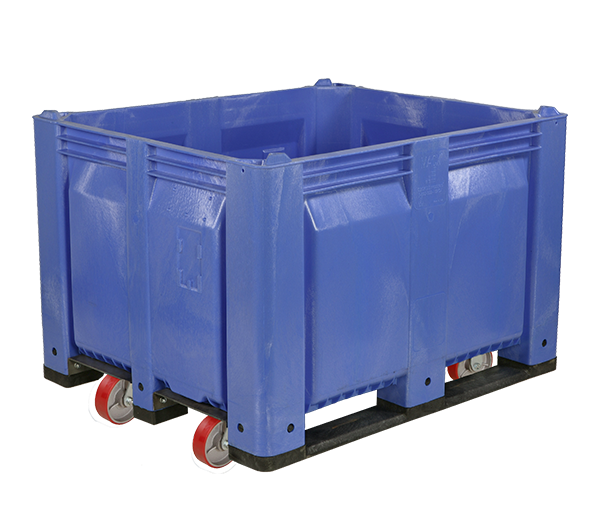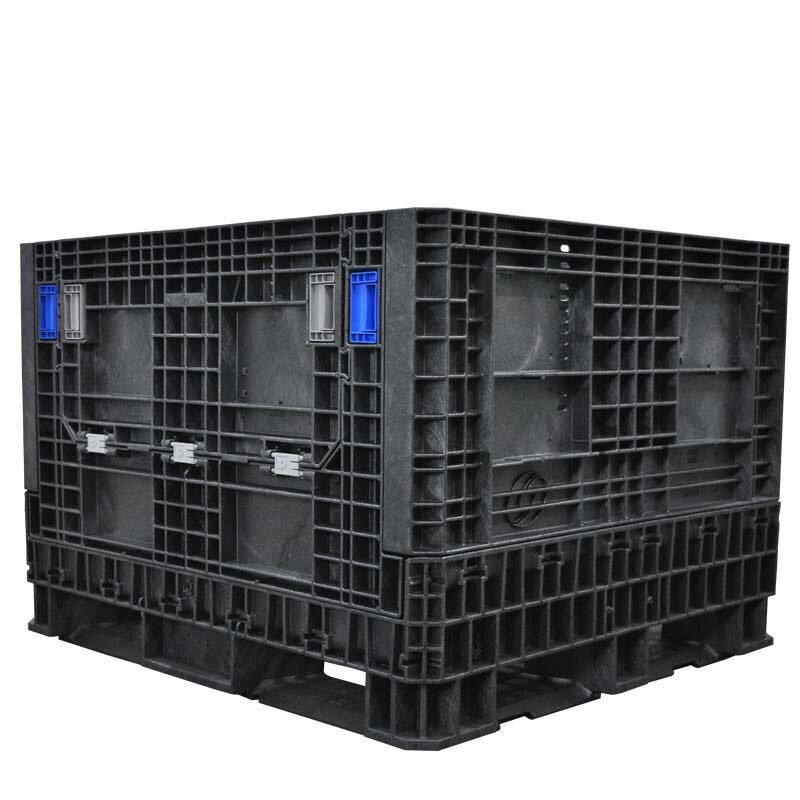Learn why Bulk Plastic Containers are ideal for modern warehousing needs
The Function of Mass Plastic Containers in Effective Recycling Practices and Sustainability
Mass plastic containers are integral to modern recycling initiatives. Their design boosts the performance of material collection and transportation, adding to sustainability goals. These containers not just enhance room yet additionally help in keeping track of contamination levels. Their execution is not without obstacles. Understanding the full extent of their influence exposes a complicated partnership in between logistics and environmental duty that calls for further exploration.
Comprehending Mass Plastic Containers
Mass plastic containers serve as an essential element in numerous sectors, promoting the storage and transportation of items. These containers are commonly made from robust products such as high-density polyethylene (HDPE) or polypropylene, which supply durability and resistance to environmental aspects. Their design often includes functions like stackability and modularity, enabling for efficient use area during both storage space and transit.
Industries such as agriculture, food processing, and producing regularly make use of mass plastic containers because of their lightweight nature and convenience of handling. The containers are available in various dimensions and setups, dealing with the specific needs of various products. Their flexibility expands beyond mere performance; they can also be tailored with covers, manages, and classifying options to enhance usability - bulk plastic containers for sale. Therefore, bulk plastic containers play a critical function in maximizing logistics and supply chain operations across multiple sectors, thus adding to general efficiency and cost-effectiveness
Advantages of Utilizing Mass Plastic Containers in Recycling
When companies focus on reusing efforts, the use of bulk plastic containers substantially improves the performance of the process. These containers are designed to enhance space, enabling the storage and transportation of larger quantities of recyclable products. This causes less trips to reusing facilities, consequently minimizing fuel usage and associated discharges.
Furthermore, mass plastic containers are resilient and immune to numerous ecological aspects, making sure that materials remain protected during handling and transportation. Their light-weight style better adds to reduce transportation expenses.
Additionally, the uniformity of these containers facilitates much better sorting and handling of recyclable products, which can enhance overall recycling rates - plastic bulk containers. Organizations that adopt bulk plastic containers additionally demonstrate a dedication to sustainability, favorably affecting their brand name picture. Eventually, these benefits not only simplify reusing practices but also add to more comprehensive ecological objectives
Just How Mass Plastic Containers Facilitate Material Collection
Efficient material collection is significantly improved by the use of mass plastic containers, as they give a structured and efficient remedy for gathering recyclable products. These containers are made to suit huge volumes of products, which streamlines the sorting and storage procedure. Their stackable design makes the most of space application, making it simpler for facilities to arrange recyclables without clutter.
On top of that, mass plastic containers are long lasting and weather-resistant, allowing for outside placement without deterioration. This durability assures that products stay secured until they are gathered for processing.

The uniformity in shapes and size of these containers helps with standardization across collection points, enabling better monitoring of recyclable quantities. Their transparent nature allows for easy exposure of components, helping in the tracking of contamination levels and guaranteeing that just ideal materials are accumulated. On the whole, bulk plastic containers play a vital function in improving the product collection process, therefore advertising efficient reusing practices.
Transport Efficiency and Environmental Influence
Transportation performance plays a necessary role in the reusing procedure, particularly via the optimization of lots capacity in mass plastic containers. By maximizing the quantity of product moved, business can significantly minimize the variety of journeys needed, therefore decreasing their carbon impact. This strategy not only improves operational effectiveness yet likewise adds to a lot more lasting ecological practices.

Optimizing Lots Ability
Optimizing tons capability is usually ignored, it plays a crucial function in boosting transportation effectiveness and minimizing environmental influence in reusing methods. By making the most of the quantity that bulk plastic containers can hold, recycling procedures can lower the variety of trips needed for transport. This not only reduces fuel consumption however also decreases the wear and tear on vehicles. Efficient tons management allows centers to utilize area efficiently, making sure that each transportation cycle is as productive as possible. Additionally, well-optimized lots can lead to better negotiations with logistics carriers, potentially reducing total costs. Eventually, boosting lots ability adds to a more sustainable recycling system by fostering reliable visit the website source usage and decreasing waste generated throughout transport.
Reducing Carbon Impact
As reusing operations endeavor to reduce their ecological influence, reducing the carbon impact related to transport becomes a vital objective. Bulk plastic containers play a crucial duty in attaining this objective by enhancing lots effectiveness and maximizing logistics. Their lightweight yet durable layout permits for maximum freight area usage, lowering the number of trips needed to deliver products. By settling shipments, recycling facilities can decrease gas usage and greenhouse gas discharges. Furthermore, purposefully locating recycling facilities decreases transport distances, in addition reducing carbon results. Moreover, employing fuel-efficient vehicles and different energy resources boosts total sustainability. By incorporating these techniques, the recycling market can substantially decrease its carbon impact, contributing to a try this web-site much more lasting future.
Challenges in using Mass Plastic Containers

Contamination Concerns
Contamination issues stand for a substantial difficulty in the efficient use of mass plastic containers within recycling methods. These containers typically collect residues from previous materials, bring about mixed materials that can impede the reusing procedure. Contaminants such as food waste, chemicals, or non-recyclable materials can jeopardize the stability of the whole set, causing enhanced disposal costs and reduced recycling prices. Furthermore, incorrect cleansing or sorting can intensify these problems, making it challenging for recycling facilities to process materials successfully. The visibility of pollutants not only affects the high quality of recycled products but also undermines the total sustainability initiatives focused on minimizing plastic waste. Dealing with these contamination challenges is vital for boosting the effectiveness of mass plastic container recycling.
Recycling Framework Limitations
Ineffectiveness in reusing facilities poses significant obstacles for the reliable management of bulk plastic containers. Numerous reusing facilities do not have the capability to refine huge quantities of these containers efficiently, resulting in enhanced hold-ups and expenses. Furthermore, inadequate arranging modern technologies often result in contamination, as mass containers might be combined with various other materials, making complex the recycling procedure. Limited transport alternatives likewise hinder the activity of mass plastic containers to ideal reusing centers, leading to enhanced landfill waste. In addition, a lack of standard protocols for bulk container reusing develops confusion among services and customers, better making complex initiatives to promote sustainability. Resolving these infrastructure restrictions is vital to boost reusing methods and maximize the capacity of bulk plastic containers in a round economic situation.
Finest Practices for Carrying Out Mass Plastic Containers
They must focus on a calculated approach that improves performance and minimizes contamination threats when companies take into consideration executing mass plastic containers in their reusing practices. Picking the proper container size and type is crucial to accommodate the volume of materials being processed. Organizations needs to additionally establish clear labeling and signage to lead users on proper disposal methods, decreasing complication and mistakes. Normal training sessions for personnel can even more reinforce these methods, ensuring everyone recognizes their functions in maintaining recycling honesty.
Furthermore, companies must carry out a routine maintenance schedule to inspect and tidy containers, stopping the accumulation of pollutants. Partnering with regional reusing centers can additionally streamline the collection process, ensuring that products are efficiently refined. Ultimately, organizations ought to keep track of and evaluate their reusing metrics, utilizing this data to improve techniques with time and advertise continuous improvement in their sustainability efforts.
The Future of Mass Plastic Containers in Lasting Practices
As companies progressively focus on sustainability, the function of mass plastic containers in reusing practices is set to develop significantly. Developments in products scientific research are leading to the development of eco-friendly and recyclable alternatives, improving the ecological benefits of mass plastic containers. On top of that, the implementation of closed-loop systems will certainly permit much easier collection and repurposing of these containers, decreasing waste and source usage.
Technical innovations, such as wise monitoring systems, will allow companies to keep track of the lifecycle of mass containers, enhancing efficiency in reusing processes. As customer demand for sustainable techniques grows, companies will likely adopt mass plastic containers developed for reuse and lasting value. Collaboration in between governments and sectors will foster the facility of standard reusing protocols, ensuring that mass containers are efficiently incorporated into wider sustainability campaigns. Overall, the future of bulk plastic containers appears encouraging, with considerable capacity for contributing to a circular economic climate.
Frequently Asked Questions
Exactly How Are Mass Plastic Containers Made and What Materials Are Utilized?
Bulk plastic containers are typically made from high-density polyethylene (HDPE) or polypropylene (PP) These materials are processed via shot molding or strike molding techniques, resulting in durable, light-weight containers appropriate for different storage and transport requirements.
Can Bulk Plastic Containers Be Reused Numerous Times Before Recycling?
Yes, bulk plastic containers can be recycled numerous times before recycling. Their longevity and style permit duplicated usage in various applications, advertising sustainability and source efficiency while lowering the demand for new containers.

What Qualifications Exist for Mass Plastic Containers in Recycling?
Different qualifications for bulk plastic containers consist of the Recycling Collaboration's accreditation, the Cradle to Cradle Licensed ™ requirement, and the Sustainable Product packaging Coalition's guidelines, ensuring containers fulfill specific ecological and recyclability standards for effective recycling.
Exactly How Do Bulk Plastic Containers Contrast to Other Recycling Storage Options?
Mass plastic containers provide greater durability and ability compared to other reusing storage space alternatives, decreasing the threat of contamination and facilitating reliable transportation. Their layout sustains far better organization, improving overall efficiency in reusing operations.
What Is the Lifespan of a Mass Plastic Container in Recycling Processes?
The life expectancy of a mass plastic container in reusing processes commonly ranges from 5 to one decade, depending on use, worldly quality, and ecological problems, enabling numerous cycles of use prior to ultimate disposal or recycling.
When companies focus on recycling initiatives, the usage of mass plastic containers greatly boosts the performance of the procedure. Transportation effectiveness plays an important duty in the reusing process, particularly through the optimization of tons capacity in bulk plastic containers. The usage of bulk plastic containers in reusing methods encounters considerable difficulties, especially worrying contamination issues and limitations within reusing framework. Contamination problems stand for a considerable challenge in the efficient use of bulk plastic containers within recycling methods. When organizations take into consideration executing mass plastic containers in their reusing practices, they ought to focus on a strategic strategy that enhances effectiveness and minimizes contamination dangers.